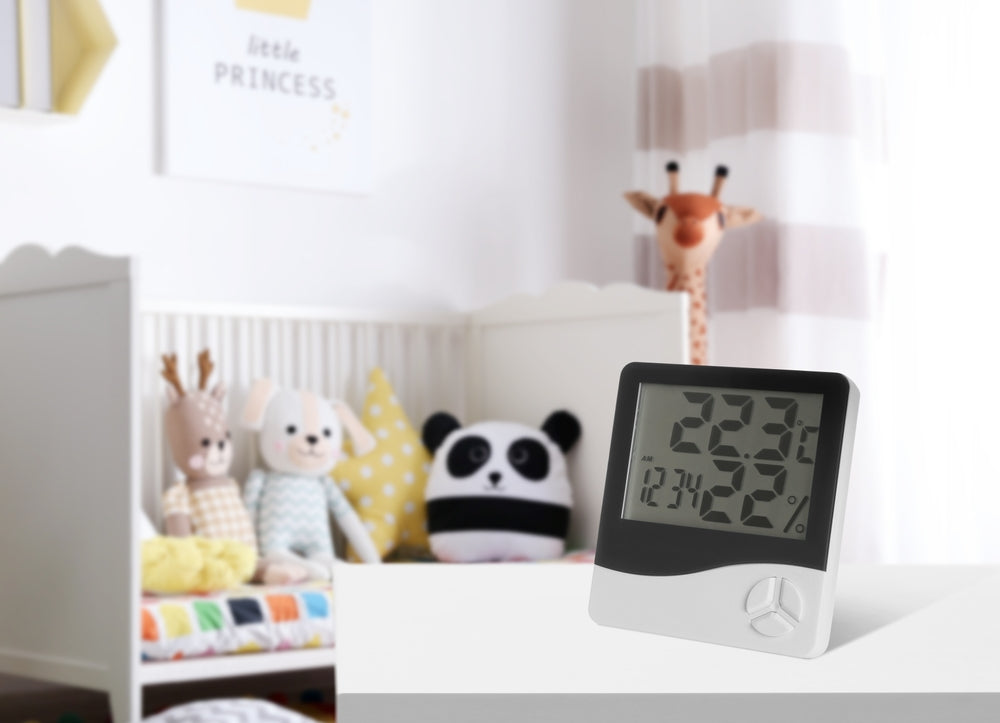Free U.S. Shipping On Orders Over $150

Dry Air and Sleep: How Low Humidity Can Lead to Discomfort and Restless Nights
Posted on
Low humidity is not quite as bad for your sleep and health as too much humidity, but it can cause enough discomfort to make sleeping well difficult. Dry air can also cause health problems.
Low humidity conditions typically occur in the winter as temperatures drop and air loses its capacity to hold water. Heating your home tends to make the air even drier. Low humidity can also occur during warmer months in some places like Texas and Arizona that get hot and dry summers.
Fortunately, there are several ways to deal with dry air in your bedroom. But first, here are some of the problems that very low humidity can cause.
By the way, what counts as dry air is relative humidity below 30%. The ideal humidity level in the home is between 30 and 50 percent.
Low Humidity Causes Respiratory Discomfort
Even if you don't have a hygrometer to check the humidity level in your home, you can tell when the air is too dry. You will feel it in your nose and throat.
Your nostrils get dry and it can get to a point where breathing is a bit painful. You may also experience a sore throat, nosebleeds, coughing, wheezing, runny nose and other respiratory discomforts.
In addition to being a pain in the ass, all these symptoms also make it hard to get a good night’s sleep. If your nose hurts everytime you take a breath, you’ll likely find yourself also dealing with insomnia. Nose bleeds waking you up in the middle of the night will also ruin your sleep quality.
Dry Air Can Worsen Respiratory Health
For people with existing respiratory health problems like asthma, bronchitis and COPD, dry air can be a severe and even deadly problem. Low humidity worsens symptoms of respiratory diseases and can cause flare ups and attacks.
Dry Air is Bad For Your Skin
Dry air sucks moisture away from your body, leaving your skin dry and dehydrated. Prolonged exposure to low humidity can make your skin itchy and flaky. Your skin also becomes vulnerable to damage and infection since dry air compromises its function as a barrier.
As skin loses water, it becomes less elastic and wrinkles start to form. So if your home has low humidity for months at a time, it can make your skin wrinkle and age faster.
Low humidity can also trigger or worsen skin conditions like eczema, acne and atopic dermatitis.
Also watch out for your hair when the air is dry. It can get frizzy, brittle and more vulnerable to damage. Use a good quality moisturizer to protect your hair.
Dry Air Can Leave You Dehydrated
If you are not careful about drinking plenty of fluids, a low humidity environment can easily cause dehydration, which in turn causes a wide range of health problems.
If you notice you are feeling tired, you have a headache and you’ve not been peeing as often as you normally do, get some fluids inside you.
Dry Air Worsens Allergies
We’ve discussed before how too much humidity traps allergens and pollutants in the air, which can cause allergy symptoms.
Too low humidity can also worsen allergies, but through a different mechanism. As the air gets dry, allergens like dust and mold spores spread in the air more easily, triggering allergy attacks. It doesn't help that your nose is already dry, so there is less mucus to trap allergens.
Dry Air is Bad for Mental Health
All the combined effects of low humidity can take a toll on your mental health. Low humidity can cause or worsen stress and anxiety. It can also worsen symptoms of depression.
Poor mental health inevitably leads to poor sleep, which further worsens mental health.
5 Tips to Deal With Low Humidity
- A humidifier is the best way to maintain your home at the right humidity level. Look for one with an auto mode that automatically turns on and off depending on current humidity. You can get a small humidifier just for your bedroom or a large one for your entire home.
- An ultrasonic diffuser can also work as a humidifier for smaller spaces. Use it with or without essential oils.
- If you live in a place that gets dry and hot, use a swamp cooler (evaporative AC) to cool your home while also increasing humidity.
- Remember to stay hydrated. Hydrate your skin as well by regularly applying moisturizer.
- In winter, keep the AC at 68F. It’s the best temperature to keep your home comfortable without making the air overly dry. If you are using a space heater, get an infrared heater instead of a fan heater. Fan or forced air heaters can make the air drier.
Final Thoughts
These tips are useful when dealing with dry air inside your home, where it’s easier to control your environment.
Once you go outdoors, it’s impossible to control humidity. The best solution is to protect yourself from the effects of low humidity. Carry water with you to stay hydrated, keep your skin well moisturized, use lip balm to prevent lips from cracking and don't forget to moisturize your hair as well.
And if you work in an office where the air sometimes gets too dry, consider a personal humidifier for your desk.
Quick links
Contact
6063 Hudson Road #160
Woodbury, MN 55125
Yo@hercLeon.com
Leave a comment: